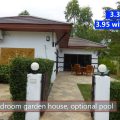Buying an apartment in Thailand
By VIP Real Estate Ltd In Buy Property in Thailand, Invest in Thailand, Investment Details On February 23, 2016
Buying a New or Second-hand Apartment in Thailand
Thai law is different if you buy an apartment or a house. This article focuses on buying an apartment.
Legal ownership
The legal aspects are clear, simple and safe and it’s easy for a foreigner to buy a condominium and get the deed issued in his name.
The buyer can trust that after the deed has been registered and transferred in his name, there is no debt or any outstanding payments from the previous owner.
Foreigners can own up to 49% of all apartments in an apartment building measured by square meters. When you buy an apartment, you therefore need to make sure the seller guarantees that you can be legally registered as the owner.
Requirements
In order to be registered as the legal owner, a foreigner must fulfill the following requirements:
The buyer must transfer the purchase price in a foreign currency to a bank account in Thailand and get a statement from the bank that proves the transaction and the amount. This original statement must be presented to the Land Office.
If the buyer goes to the Land Office in person, he needs to present a valid passport with a valid entry stamp or a valid visa.
If the buyer lets us handle the paperwork at the Land Office, then he needs to sign a legal power of attorney, which must be signed by two attesting witnesses who live in Thailand, or by a notary public if it is signed outside Thailand. In some countries the power of attorney also needs to be approved by the Thai embassy in that country.
At the Land Office
D2 Real Estate Co., Ltd. and VIP Real Estate Co., Ltd. always help our customers with these documents and also accompany the buyers to the Land Office to ensure a smooth and easy transfer.
The procedure at the land office is quite unproblematic, fast and safe. In the Land Office an official agreement between the seller and buyer is produced, or between the seller and the person who presents a power of attorney from the buyer.
After that, taxes and transfer expenses will be calculated and must be paid in cash or with a bank check. After payment the Land Office will register the transfer of the apartment and the buyer will be given the legal real estate document (as we know as the deed).
In Thai this document is called a CHANOT and is the original document that was produced when the building was built. After that the chanot is handed over from owner to owner and it is being marked by the Land Office at every change of ownership.
The whole procedure takes less than a day and there is no further waiting time for any documents.
Existing apartments
In case of existing apartment ready to take over, the buyer usually pays a deposit of 10% which is lost if the buyer doesn’t pay the full purchase amount as agreed. The remaining 90% is usually paid in cash or by a bank check on the day when the property is handed over to the new owner in the Land Office.
Usually a seller accepts a 30 days from the contract is signed until the final transfer can be completed. If the buyer needs more time, then the deposit is usually agreed to be higher than 10%.
A second-hand apartment is always bought “as seen” and no further clauses can be added to the contract at the Land Office, as this contract is 100% standard and cannot be modified.
The procedure when selling an apartment is the same, and when an apartment is sold, the owner can immediately transfer the amount registered in the Land Office to any foreign bank account in any currency without problems.
Expenses
The overhead expenses for a transfer of property are a combination of four or five different taxes and fees and as a general rule they add up to around 6.5% of the purchase price. In some special cases the amount can be different.
Usually it is being agreed between buyer and seller that these expenses are shared equally. If an apartment is bought fully furnished or including other items that must be paid for, then buyer and seller can agree on the specific price for these overheads, and that doesn’t have to be included in the contract made by the Land Office and therefore no further taxes or fees will be added to this part of the purchase price.
New-built apartments
The procedure is essentially the same as for existing condominiums, but with the difference that a new-built apartment building must be completed and approved by the authorities before the Land Office can issue the original documents. Therefore the buyer must wait for the building to be completed and the documents to be produced before he can go to the Land Office and register the purchase.
In that case there are a number of different options regarding payments and agreements between seller and buyer and they don’t follow the same easy rules as for second-hand condominiums. Therefore the buyer always should be careful to buy from a seller he can trust, as there is a risk involved when it comes to the expected time for the completion of the apartment building.
Please contact D2 Real Estate Co., Ltd. or VIP Real Estate Co., Ltd. directly for any advice and guidance in such cases.
VIP Real Estate Co., Ltd.
VIP Real Estate Co., Ltd. was established in 1988 with a net worth of 200 million Thai Baht or around 6.5 million USD and has been involved in literally thousands of transactions with foreign customers.
Author: Jens Brochner Nielsen, CEO
Thailand, 2016










